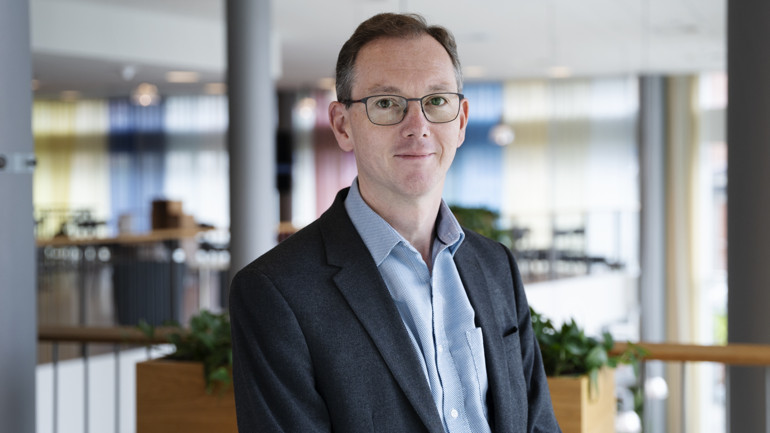Derek Hutcheson, Vice Dean for Doctoral Education/Pro Dean

Over the last two years we have undergone an extensive review of our doctoral education, which came in three stages:
• self-evaluations of all subjects in winter 2021-22;
• the external reviewers’ report in late 2022; and a separate evaluation of administrative practices by Malin Ideland, now Pro Vice Chancellor for Research and Doctoral Education.
• Reflection on these findings in the first half of this year, which resulted in the Doctoral Education Action Plan passed in summer 2023.
The external review was generally extremely positive about the foundation we had built in doctoral education. But, of course, there is always room for improvement, and as the next stage of the Action Plan, a series of changes will take effect from 1 January 2024 that should set our doctoral education up for the years to come. There are three principles underlying these changes:
• Decision-making chains should be shorter, if possible.
• Ultimately responsibility for decisions must be clear, and decisions should be taken as locally as possible.
• In line with the general decentralisation that has taken place in doctoral education, departmental collegial structures should be given more responsibility for quality assurance.
Many of the changes relate to the decision-making processes, rather than the academic content. They should hopefully mean that decisions can be taken more quickly, and that certain aspects of the doctoral experience – such as admission, progression and preparations for defences – go more smoothly. In practice, they will mean that the heads of department will play a greater role than hitherto, and that certain committee processes are speeded up. On 21 November, the Dean formally decided on changes to the Delegation Ordinance from 1 January 2024. Between now and the end of the year, it is intended that the steering documents relating to doctoral education will be updated to reflect the new rules. But – as always – working to the highest quality remains a priority, and departments will now have even more direct responsibility for ensuring that their doctoral educations run as smoothly as possible.
Another significant step forward in our doctoral education came with the Vice Chancellor’s decision on 23 October 2023 to approve the new Organisation Studies subject. It will have its formal home in the Department of Urban Studies, but also involve a wide range of other actors across the university, building a strong new environment in that area. The November FFN approved its General Study Plan, and new doctoral positions will shortly be advertised. Also worth noting is that on 15 December, Calle Håkansson will defend his PhD – the first to be defended in Global Politics, which was hitherto the newest subject in the faculty. (Before, that, however, don’t miss Zahra Hamidi’s defence in Urban Studies on 1 December!)
This will be my last blog post in my current capacity as Vice Dean for Doctoral Education. During slightly more than four years in the role, I have been privileged to see seventeen people defend their PhDs in the faculty (not including Calle and Zahra, who will defend before the end of the year), and witnessed a significant growth in the number of doctoral students, especially externally-funded ones. Four years ago we were the only faculty that did not have doctoral students in so-called ‘graduate schools’; now, we have several in all three departments, not least due to colleagues’ growing success in attracting external funding for cross-university collaboration as well as research projects that involve doctoral students.
I will remain in the faculty management group as Pro Dean, but am delighted to be able to announce that the Dean decided last week to appoint Dr Magnus Andersson as vice dean for doctoral education from 1 January 2024. Magnus is associate professor in the Department of Urban Studies. I thank you all for your cooperation since 2019, and am sure that Magnus will benefit – as I have – from the valuable advice and support the doctoral education coordinators; the research administrators and research liaison officers; members of the faculty’s FFN committee; and not least, all the supervisors and doctoral students themselves. I look forward to watching KS doctoral education flourish in your collective hands, as it enters the next chapter of its development!
COMING UP
Seriestaden Malmö 25 år: Från digital eufori till det analogas återkomst
Torsdag 30 november, 14:00 – 16:00
Malmö konsthall, C-salen
Migration seminar: Tourism in Multicultural Societies
Thursday 30 November, 14:15 – 16:00
Niagara, Nordenskiöldsgatan 1, or Zoom
Disputation – Zahra Hamidi
Fredag 1 december, 13:15 – 17:00
Niagara, hörsal B (NI:B0E15), Nordenskiöldsgatan 1
From urban grievance to urban struggle: On the history of urban social movements
Monday 4 December, 15:15 – 17:00
Niagara, Lecture Hall Ni:A0606, Nordenskiöldsgatan 1
Docentföreläsning med Gustav Hägg
Tisdag 5 december, 15:15 – 16:00
Niagara, NI:A0507, Nordenskiöldsgatan 1
Migration seminar: Kids in action promoting health equity in socially deprived areas
Thursday 7 December, 14:15 – 16:00
Niagara, Nordenskiöldsgatan 1, or Zoom
Re-Imaginatorium 1: Samskapande Malmö 2040
Fredag 8 december, 09:00 – 16:00
Media Evolution, Stora Varvsgatan 6a
Frukostmöte om mänskliga rättigheter
Måndag 11 december, 08:30 – 10:00
Nereus, Representationsrummet, plan 3
Virtuell UNIC-konferens: Tillvägagångssätt i ’superdiversa’ städer: religion, samhälle och kultur
Måndag 11 december, 10:00 – Tisdag 12 december, 13:30
Please note that the listed events are only a selection of all events taking place at Malmö University. Go to the full list of events and register..
Do you also want your event to appear in the calendar? Here are instructions on how to publish in the calendar.
